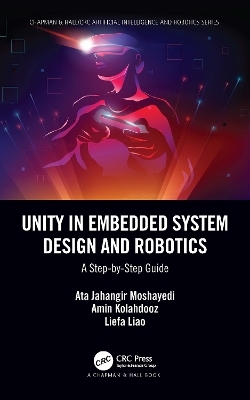
Unity in Embedded System Design and Robotics
Chapman & Hall/CRC (Verlag)
978-1-032-21477-1 (ISBN)
The first book of its kind, Unity in Embedded System Design and Robotics provides a step-by-step guide to Unity for embedded system design and robotics. It is an open gateway for anyone who wants to learn Unity through real projects and examples as well as a particularly useful aid for both professionals and students in the fields of embedded system design and robotics.
Each chapter contains a unique project. The user is guided through the different windows and sections of Unity every step of the way. The book also includes projects that connect Unity to Arduino and Raspberry Pi, which will help readers better understand various Unity applications in the real world.
Dr Ata Jahangir Moshayedi is an associate professor at Jiangxi University of Science and Technology, China. He received his PhD in Electronic Science from Savitribai Phule Pune University, India. He is a member of IEEE, a life member of the Instrument Society of India (ISI) and Speed Society of India (SSI), and various conferences and journals. His research interest includes Robotics and Automation, Sensor Modelling, Bio-inspired robots, Mobile Robots, Embedded System, Machine Vision-based Systems, Virtual Reality, and Artificial Intelligence. He has published several papers in various journals and conferences and registered two patents so far in robotic and machine vision. Dr Amin Kolahdooz received his PhD from BNUT in January 2015. He works as a Lecturer (Assistant Professor) at the school of Engineering and Sustainable Development, De Montfort University, UK. His research interests are mechanics and manufacturing engineering focused on Materials Processes, Machine Learning, VR, and AR in Manufacturing, Finite Element, and optimization methods. He registered one national patent, and published six books, and more than 70 articles in various world-renowned journals so far. Leifa Liao is a professor at Jiangxi University of Science and Technology, a visiting scholar at Rochester University of Technology, a PhD in Management Science and Engineering from Xi’an Jiaotong University, and a key young and middle-aged teacher Jiangxi Province. He won the second prize for the 14th outstanding social science achievement in Jiangxi Province in 2011. Third Prize of the 15th Provincial Outstanding Achievement in Social Science of the Province. In 2015, he was the top ten teachers of Jiangxi University of Science and Technology. He published 50 papers and presided over 4 National Natural Science Foundations on the research of the Relationship between Organizational Learning and Knowledge Level Based on Multi-Agent Simulation.
Chapter 1 ◾ General Information and Essential Parts of Unity
Chapter 2 ◾ Example 1: Spinning Earth
Chapter 3 ◾ Example 2: Wooden Doll Body
Chapter 4 ◾ Example 3: Create the Semi Jungle Environment
Chapter 5 ◾ Example 4: Create KUKA Robot
Chapter 6 ◾ Example 5: Create BAYMAX Body and Movement
Chapter 7 ◾ Example 6: Create Two-wheeled Robot with Gripper and Movement
Chapter 9 ◾ Example 8: Y-BOT Character Movement
Chapter 10 ◾ Example 9: Flower Example with Sound and Image and Keyboard Control
Chapter 11 ◾ Example 10: KUKA_II
Chapter 12 ◾ Example 11: Communication between ARDUINO and UNITY
Chapter 13 ◾ Example 12: SpongeBob, Control object by Keyboard and Arduino
Chapter 14 ◾ Example 13: Object Movement with Kinect
Chapter 15 ◾ Example 14: Log and Display Joint Coordinates with Kinect
Chapter 16 ◾ Example 15: Unity and Kinematics
Chapter 17 ◾ Running Unity Project on Raspberry Pi
Chapter 18 ◾ Unity and ROS Bridge
Chapter 19 ◾ Example 16: Unity and Mobile Sensors Bond
| Erscheinungsdatum | 13.07.2022 |
|---|---|
| Reihe/Serie | Chapman & Hall/CRC Artificial Intelligence and Robotics Series |
| Zusatzinfo | 18 Tables, color; 576 Line drawings, color; 8 Halftones, color; 584 Illustrations, color |
| Sprache | englisch |
| Maße | 156 x 234 mm |
| Gewicht | 1180 g |
| Themenwelt | Informatik ► Theorie / Studium ► Künstliche Intelligenz / Robotik |
| Informatik ► Weitere Themen ► Hardware | |
| ISBN-10 | 1-032-21477-5 / 1032214775 |
| ISBN-13 | 978-1-032-21477-1 / 9781032214771 |
| Zustand | Neuware |
| Informationen gemäß Produktsicherheitsverordnung (GPSR) | |
| Haben Sie eine Frage zum Produkt? |
aus dem Bereich


